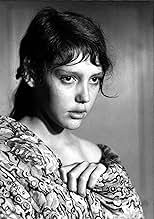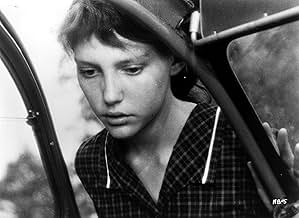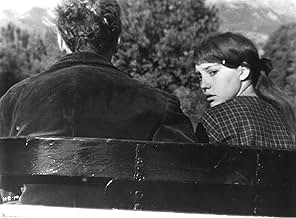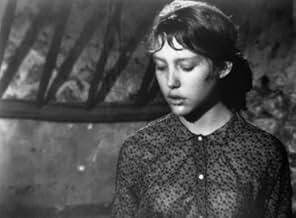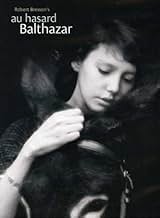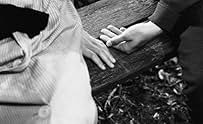AVALIAÇÃO DA IMDb
7,7/10
24 mil
SUA AVALIAÇÃO
A história de um jumento maltratado e das pessoas ao seu redor. Um estudo sobre santidade e uma peça que faz relação com "Mouchette, a Virgem Possuída", também de Robert Bresson.A história de um jumento maltratado e das pessoas ao seu redor. Um estudo sobre santidade e uma peça que faz relação com "Mouchette, a Virgem Possuída", também de Robert Bresson.A história de um jumento maltratado e das pessoas ao seu redor. Um estudo sobre santidade e uma peça que faz relação com "Mouchette, a Virgem Possuída", também de Robert Bresson.
- Prêmios
- 7 vitórias e 2 indicações no total
Mylène Van der Mersch
- Nurse
- (as Mylène Weyergans)
Avaliações em destaque
To read through most reviews of Balthazar feels like having stepped inside a church with people sighing about god and transcendence, which is a testament to Bresson's power here in his most spiritual work so far. But let me step outside in clear air for a moment.
It was an ongoing project for him, striving for an ascetic eye that purifies. He had began (essentially) with Diary of a Priest, ambitious work about a spiritual journey. But I believe he was troubled by a few things in it, if his next films offer any clue.
He spent the next couple of films completely muting the emotional turmoil evident in Diary, taking all the romanticism out, making them purely about the desire to break free from a prison-world. Pickpocket and Jeanne D'Arc were sketches in that austere direction. But this was setting him down a disastrous path where the only thing purer was was just more and more bare. When does fasting become starving and why is a stone floor purer than a furnished house?
How about we say that his desire to evoke the abstract was laudable, but his dogmatic way of doing it absolutely killed the world in which it lives and hides? His camera murders it. It only managed to take the pure out of life and make a liturgy around its dead body. It was destroying the possibility for cinematic space to support metaphor, inner life, poetry, and to simply be anything other than dead nature. The process of facts alone won't do, they can never convey life, much less pure life.
So I had my sights set on Balthazar as his most pure, most lauded, and expected perhaps to mount a critique of a spirituality that is only its own funeral. But I believe he beat me to the punch. I believe he began to see that he was starving himself, at least so far as the film is different from before.
This is his most lush, his most ambitious since Diary (none of the interim were), his most accomplished and with the most life. His camera doesn't just stare, it moves again and searches. He doesn't just create ellipsis within a scene, he makes it move across the narrative.
A household collapses, but we move to see this in the girl's disastrous relationship with a despicable bully, and we experience the loss of innocence, the fouling of kindness in her world, in Balthazar's treatment at the hands of several callous owners.
At the center Bresson has the most placid, most unassuming actor, a selfless being. It's by reading what we do in Balthazar's eyes that we color the whole and it ripples through and becomes ours. We have the reactions he doesn't and thus humanize ourselves. It's marvelous and it plumbs into something fundamental about how the world is put together that makes it worthy beyond technique.
See, life will break down, sometimes for no other reason than someone changed his mind about a deal and pride. It will break and scatter in pieces, go through the cycle of suffering. The film ends with everything broken, nothing put back together, the girl having left off for a next life somewhere.
What it plumbs is that what we see into these makes a difference. There's abandonment at the end, heartbreak, anonymous loss of a soul that we knew as dear. But I would rather see courage myself. Instead of projecting our human terror into him, take from his capacity to endure. If suffering isn't pain, it's not being able to abide pain; how about there is nothing lost, nothing broken, there is only a time for things to come together and a time to disperse again? Balthazar isn't lost, he has returned, or so it goes maybe.
It was an ongoing project for him, striving for an ascetic eye that purifies. He had began (essentially) with Diary of a Priest, ambitious work about a spiritual journey. But I believe he was troubled by a few things in it, if his next films offer any clue.
He spent the next couple of films completely muting the emotional turmoil evident in Diary, taking all the romanticism out, making them purely about the desire to break free from a prison-world. Pickpocket and Jeanne D'Arc were sketches in that austere direction. But this was setting him down a disastrous path where the only thing purer was was just more and more bare. When does fasting become starving and why is a stone floor purer than a furnished house?
How about we say that his desire to evoke the abstract was laudable, but his dogmatic way of doing it absolutely killed the world in which it lives and hides? His camera murders it. It only managed to take the pure out of life and make a liturgy around its dead body. It was destroying the possibility for cinematic space to support metaphor, inner life, poetry, and to simply be anything other than dead nature. The process of facts alone won't do, they can never convey life, much less pure life.
So I had my sights set on Balthazar as his most pure, most lauded, and expected perhaps to mount a critique of a spirituality that is only its own funeral. But I believe he beat me to the punch. I believe he began to see that he was starving himself, at least so far as the film is different from before.
This is his most lush, his most ambitious since Diary (none of the interim were), his most accomplished and with the most life. His camera doesn't just stare, it moves again and searches. He doesn't just create ellipsis within a scene, he makes it move across the narrative.
A household collapses, but we move to see this in the girl's disastrous relationship with a despicable bully, and we experience the loss of innocence, the fouling of kindness in her world, in Balthazar's treatment at the hands of several callous owners.
At the center Bresson has the most placid, most unassuming actor, a selfless being. It's by reading what we do in Balthazar's eyes that we color the whole and it ripples through and becomes ours. We have the reactions he doesn't and thus humanize ourselves. It's marvelous and it plumbs into something fundamental about how the world is put together that makes it worthy beyond technique.
See, life will break down, sometimes for no other reason than someone changed his mind about a deal and pride. It will break and scatter in pieces, go through the cycle of suffering. The film ends with everything broken, nothing put back together, the girl having left off for a next life somewhere.
What it plumbs is that what we see into these makes a difference. There's abandonment at the end, heartbreak, anonymous loss of a soul that we knew as dear. But I would rather see courage myself. Instead of projecting our human terror into him, take from his capacity to endure. If suffering isn't pain, it's not being able to abide pain; how about there is nothing lost, nothing broken, there is only a time for things to come together and a time to disperse again? Balthazar isn't lost, he has returned, or so it goes maybe.
The star of Au hasard Balthazar is a donkey, a trained animal that has been led, goaded, into what passes, in an animal sense, for a performance. Of course there is nothing new about this - animals have been stars since Rescued By Rover - yet there is something unique about the performance of the donkey in Au hasard Balthazar, something that strikes one sort of funny if one gets to thinking about it. It has to do with the approach of Robert Bresson, a director whose way of working with actors was, shall we say, unusual. An auteurist in the purest sense, Bresson believed, zealously it seems, that the director should be the sole creative force behind a film, the one person responsible for the movie's tone, its meaning. The problem with most movies, if you look at things in a Bressonian way, is that stubborn habit of actors to sometimes change the meaning, the texture of a scene by how they play it - that irksome tendency of actors to take the creative reins themselves, and slip things into scenes that aren't meant to be there. Bresson's solution to this problem? Rehearse your actors to death, make them do take-after-take until the words no longer mean anything to them, until they have lost the ability to be spontaneous anymore, to do anything but what their director tells them to - in short, break them like animals. The people in Bresson's films perform their actions with the same hollow, mechanical absence-of-will one perceives in a circus elephant rolling a ball, and this is exactly as Bresson wants it, for it allows him to carry out his cinematic plans without fear of their being subverted by an actor who has some contradictory notion in their head of what a scene is supposed to be about, who their character is. The human actors in Au hasard Balthazar, stripped of their emotional tools, their tricks, occupy exactly the same plane as the donkey Balthazar, who is, as they are, a trained animal, an element in a composition.
The first scenes are an idyll: the foal Balthazar, new-stripped from his mother's teat, becomes the favorite pet of a group of kids spending the summer together on a farm. This is a time for frolicking, for amorously carving names into benches - but alas the childish harmony is doomed soon to end. Bresson conveys the fleetingness of youth, cutting quickly through a series of tableaux depicting carelessness and joy slightly darkened by the presence of a sickly young girl; then without warning we're presented with the realities of grown-up existence, embodied most cruelly by the image of poor Balthazar, now grown, harnessed to a salt-wagon (salt having ironically been his favorite treat during his care-free younger days). It's here that Bresson gives us an indication as to the donkey's more-than-animal nature: Balthazar, having been mistreated, rebels against his owner, tips the wagon and, about to be set upon by a mob of men with pitch-forks, flees. Some instinct - or is it conscious will? - leads Balthazar back to the farm, which has been taken over by a former schoolteacher whose daughter, Marie, once one of Balthazar's playmates, still resides, her existence a lonely one. This would seem the beginning of a new happiness for Balthazar, but the donkey's fate is alas still clouded with gloom. Marie becomes the object of the juvenile delinquent Gerard's amorous attentions; for obscure reasons the jaded miscreant is resentful of Balthazar, and avails himself of every opportunity to torture the poor beast.
Tenderness and cruelty live side-by-side in Au hasard Balthazar, and seem equally the product of an almost mindless instinct. Nowhere is this embodied more purely than in the character of Gerard (Francois Lafarge), the angry sadist who becomes Balthazar's chief tormentor. Gerard is capable of being gentle, as demonstrated by his wooing of the poor farm-girl Marie (the Pre-Raphaelite beauty Anne Wiazemsky), but he's equally capable of unfeeling viciousness, as when he ties a piece of newspaper to Balthazar's tail and sets it alight. Is Gerard a good person or a bad one? Does he hate Balthazar, does he love Marie? These questions seem of little concern to Bresson, who views human affairs in terms of irresistible internal forces. Bresson, in a mysterious, vaguely irreverent way, blurs the line between human and animal, brings human behavior into the animal world while elevating Balthazar to the quasi-human. There's an awareness to Balthazar that's more than you would expect from your average quadruped, and it's through this hint of sentience that one begins seeing the saintly qualities in Balthazar, the patient endurance of hardship, the radiance of spirit.
It's an amazingly delicate piece of work by Bresson, an audacious idea carried out with the utmost discretion and skill. Perhaps only Bresson among all filmmakers could've made this idea work, because only he had mastered the art of rendering existence nearly abstract while at the same time achieving powerful emotional effects. If the film were merely symbolist it would be irrelevant - Balthazar can of course be seen as a symbol for a lot of things, but it doesn't seem right to reduce him to some emblem of suffering, some Christ-like trope. Balthazar is above all a character, a protagonist in a drama, but of course in Bresson there is never any sense of conventional drama, of easy emotion. As a storyteller Bresson was efficient but patient - his scenes never go on longer than they need to, yet you wouldn't call the pacing urgent. There's something about Bresson's cutting that keeps the story flowing briskly while never engendering a sense of hurry. He moves from one character to another, one situation to another, with an unfussy ease that shames most conventional directors with their dependence on transitions, devices and segues. The film's very pace helps convey Balthazar's saintly nature, his perseverance. It's a work at once touching, bold, enigmatic and stirringly human.
The first scenes are an idyll: the foal Balthazar, new-stripped from his mother's teat, becomes the favorite pet of a group of kids spending the summer together on a farm. This is a time for frolicking, for amorously carving names into benches - but alas the childish harmony is doomed soon to end. Bresson conveys the fleetingness of youth, cutting quickly through a series of tableaux depicting carelessness and joy slightly darkened by the presence of a sickly young girl; then without warning we're presented with the realities of grown-up existence, embodied most cruelly by the image of poor Balthazar, now grown, harnessed to a salt-wagon (salt having ironically been his favorite treat during his care-free younger days). It's here that Bresson gives us an indication as to the donkey's more-than-animal nature: Balthazar, having been mistreated, rebels against his owner, tips the wagon and, about to be set upon by a mob of men with pitch-forks, flees. Some instinct - or is it conscious will? - leads Balthazar back to the farm, which has been taken over by a former schoolteacher whose daughter, Marie, once one of Balthazar's playmates, still resides, her existence a lonely one. This would seem the beginning of a new happiness for Balthazar, but the donkey's fate is alas still clouded with gloom. Marie becomes the object of the juvenile delinquent Gerard's amorous attentions; for obscure reasons the jaded miscreant is resentful of Balthazar, and avails himself of every opportunity to torture the poor beast.
Tenderness and cruelty live side-by-side in Au hasard Balthazar, and seem equally the product of an almost mindless instinct. Nowhere is this embodied more purely than in the character of Gerard (Francois Lafarge), the angry sadist who becomes Balthazar's chief tormentor. Gerard is capable of being gentle, as demonstrated by his wooing of the poor farm-girl Marie (the Pre-Raphaelite beauty Anne Wiazemsky), but he's equally capable of unfeeling viciousness, as when he ties a piece of newspaper to Balthazar's tail and sets it alight. Is Gerard a good person or a bad one? Does he hate Balthazar, does he love Marie? These questions seem of little concern to Bresson, who views human affairs in terms of irresistible internal forces. Bresson, in a mysterious, vaguely irreverent way, blurs the line between human and animal, brings human behavior into the animal world while elevating Balthazar to the quasi-human. There's an awareness to Balthazar that's more than you would expect from your average quadruped, and it's through this hint of sentience that one begins seeing the saintly qualities in Balthazar, the patient endurance of hardship, the radiance of spirit.
It's an amazingly delicate piece of work by Bresson, an audacious idea carried out with the utmost discretion and skill. Perhaps only Bresson among all filmmakers could've made this idea work, because only he had mastered the art of rendering existence nearly abstract while at the same time achieving powerful emotional effects. If the film were merely symbolist it would be irrelevant - Balthazar can of course be seen as a symbol for a lot of things, but it doesn't seem right to reduce him to some emblem of suffering, some Christ-like trope. Balthazar is above all a character, a protagonist in a drama, but of course in Bresson there is never any sense of conventional drama, of easy emotion. As a storyteller Bresson was efficient but patient - his scenes never go on longer than they need to, yet you wouldn't call the pacing urgent. There's something about Bresson's cutting that keeps the story flowing briskly while never engendering a sense of hurry. He moves from one character to another, one situation to another, with an unfussy ease that shames most conventional directors with their dependence on transitions, devices and segues. The film's very pace helps convey Balthazar's saintly nature, his perseverance. It's a work at once touching, bold, enigmatic and stirringly human.
Born into a world of despair, pain and fear, with a back to carry allsorts on and two eyes to fill with tears, abused and often put upon, never knowing where things might have gone, but conforming to the stick and whip, while no one hears your prayers.
Poor old Balthazar doesn't know which way to turn, on occasions folks are kind and free, at other times they let him burn, but why are they so changeable, what makes these people tick, is it natural that their spirit is to hurt, with pain inflict.
The hazards of being a young woman growing up in rural France and the challenges of a donkey with the same backdrop, both brilliantly performed by the donkey and Anne Wiazemsky, who leave you under no illusion of the suffering they have to endure.
Poor old Balthazar doesn't know which way to turn, on occasions folks are kind and free, at other times they let him burn, but why are they so changeable, what makes these people tick, is it natural that their spirit is to hurt, with pain inflict.
The hazards of being a young woman growing up in rural France and the challenges of a donkey with the same backdrop, both brilliantly performed by the donkey and Anne Wiazemsky, who leave you under no illusion of the suffering they have to endure.
Maybe I'm not as completely overwhelmed with the work of the immensely revered director Robert Bresson as others are, and I almost wish I was more so. I do know from the other films I have seen of his- Pickpocket and A Man Escaped- that he is one of the superior craftsmen of his time in France, a veritable storyteller with a very precise, original craftsmanship and way about telling his stories that shows compromise is nowhere in sight. However I don't think, try as I might (and I do love other films that do evoke religious connotations and metaphors like with Dreyer and Rossellini's films, which perhaps aren't as heavy-handed), to soak into all of the allegory of it all.
When it comes down to it, Au hasard Balthazar is a kind of fable, and it is successful even as some of the Christian connections are lost on me. It is strongest at being a dramatic look at two lives where drama doesn't need to be put to highest heights or given a shot of adrenaline. There's almost something very worn down about the characters- as well as the donkey Balthazar- that is the best part of what Bresson does try to draw parallels to. His direction might be un-easy to get along with, but it is rewarding in a cathartic way too.
Much has been written about Balthazar being a kind of saintly figure, or Jesus, who suffers all of his life and then at the end dies a sorrowful death for, perhaps, everyone else's sins. But if that side of reading into it isn't really suiting, and you're looking for just a really well-told story (which is really all a fable can do), the donkey's- and Marie's (Anne Wiazemesky) story does take on a neo-realist side to it too. It's the everyday things that count in this world, and act as burdens that don't give people the kind of life and enjoyment they could have.
While Bresson maybe doesn't have his great strengths in much of the dialog, his direction of the actors, which involved multiple takes to the point of (as with the donkey) beating the life out of it, is quite unique. Like with Pickpocket, you can tell something is so suppressed with them, even with the careless young man who Marie falls in love with- and later leaves- and the unfortunate drunk who 'takes care of Balthazar for a while, that it's no wonder nothing happy ever really comes to any of them. Also, the body language is so distinct and powerful that it really makes the uncomplicated nature of the photography and editing work that much more so. Turn the sound off and it might not even make a difference (what with lack of music)
Two of my favorite scenes might likely be two of the best scenes I've ever seen from the few Bresson films I've seen. One is when Balthazar has a brief stint in a circus, and it's interesting to see how the simplistic nature of the story reaches, for once, an almost ironically amusing point in this scene. For a moment you're pulled into that illusion of a Disney movie- where an animal is meant to be more like us, but then once reality comes back in it wipes that all away. The other scene is during a dance in a bar, where everyone's bopping away to a jazz song, and the young man mentioned before, throws bottles and causes a ruckus, but no one seems to stop dancing at all.
Are they too, who should be having a good time, that numbed by their lives to not be shook up by the disturbances around them? It is a film that really does get you thinking once it ends, about how small-town society treats things in very set ways that make some like Marie want to just get out. There's an undercurrent in the story of money being an integral- and hurtful- part of the world, where pride and suffering gets mixed up in it too. But most striking when watching the film are the scenes with the donkey, who punctuates the un-wavering methods of those around him (who very rarely are actually kind and happy around him, aside from the kids early on). These scenes display Bresson utilizing his storytelling and skills with poignancy that, if you can identify with the innocent(s) of the story, is kind of mind-blowing.
Even if the film is possibly imperfect, it nevertheless left me feeling I had seen something special. Few filmmakers can get away today with putting together a tragic story and pulling parallels between a worker animal and a misguided young woman and how others out there try to live every day. It's a brave movie more often than not that might hit (and has hit) other viewers both young and old alike. Grade: A
When it comes down to it, Au hasard Balthazar is a kind of fable, and it is successful even as some of the Christian connections are lost on me. It is strongest at being a dramatic look at two lives where drama doesn't need to be put to highest heights or given a shot of adrenaline. There's almost something very worn down about the characters- as well as the donkey Balthazar- that is the best part of what Bresson does try to draw parallels to. His direction might be un-easy to get along with, but it is rewarding in a cathartic way too.
Much has been written about Balthazar being a kind of saintly figure, or Jesus, who suffers all of his life and then at the end dies a sorrowful death for, perhaps, everyone else's sins. But if that side of reading into it isn't really suiting, and you're looking for just a really well-told story (which is really all a fable can do), the donkey's- and Marie's (Anne Wiazemesky) story does take on a neo-realist side to it too. It's the everyday things that count in this world, and act as burdens that don't give people the kind of life and enjoyment they could have.
While Bresson maybe doesn't have his great strengths in much of the dialog, his direction of the actors, which involved multiple takes to the point of (as with the donkey) beating the life out of it, is quite unique. Like with Pickpocket, you can tell something is so suppressed with them, even with the careless young man who Marie falls in love with- and later leaves- and the unfortunate drunk who 'takes care of Balthazar for a while, that it's no wonder nothing happy ever really comes to any of them. Also, the body language is so distinct and powerful that it really makes the uncomplicated nature of the photography and editing work that much more so. Turn the sound off and it might not even make a difference (what with lack of music)
Two of my favorite scenes might likely be two of the best scenes I've ever seen from the few Bresson films I've seen. One is when Balthazar has a brief stint in a circus, and it's interesting to see how the simplistic nature of the story reaches, for once, an almost ironically amusing point in this scene. For a moment you're pulled into that illusion of a Disney movie- where an animal is meant to be more like us, but then once reality comes back in it wipes that all away. The other scene is during a dance in a bar, where everyone's bopping away to a jazz song, and the young man mentioned before, throws bottles and causes a ruckus, but no one seems to stop dancing at all.
Are they too, who should be having a good time, that numbed by their lives to not be shook up by the disturbances around them? It is a film that really does get you thinking once it ends, about how small-town society treats things in very set ways that make some like Marie want to just get out. There's an undercurrent in the story of money being an integral- and hurtful- part of the world, where pride and suffering gets mixed up in it too. But most striking when watching the film are the scenes with the donkey, who punctuates the un-wavering methods of those around him (who very rarely are actually kind and happy around him, aside from the kids early on). These scenes display Bresson utilizing his storytelling and skills with poignancy that, if you can identify with the innocent(s) of the story, is kind of mind-blowing.
Even if the film is possibly imperfect, it nevertheless left me feeling I had seen something special. Few filmmakers can get away today with putting together a tragic story and pulling parallels between a worker animal and a misguided young woman and how others out there try to live every day. It's a brave movie more often than not that might hit (and has hit) other viewers both young and old alike. Grade: A
During the nineteenth century ,the comtesse de Segur wrote a novel for the children called "memoirs of a donkey" .A very pious writer,she chose the donkey as a symbol of humility...as Robert Bresson did I suppose.The very first pictures of the movie,with the children,"christening" the donkey ,might be a nod to the writer whom the young Bresson,like all his generation must have read when he was a young boy."Au hasard Balthazar " is an updated version of "les memoires d'un ane" ,but a very austere story:although Bresson's work enjoys a very high rating on the site,I must say that it's not for all tastes.I cannot imagine,say, a "matrix" fan getting enthusiastic about it.
Bresson's actors are non -professionals -with the exception of Anne Wiazemski,but it was her debut;then she became the par excellence intellectual actress,for the likes of Godard,Tanner and Garrel,all directors that easily make me yawn my head off-,but do not expect a "natural "performance.I hope the non-French speaking who wrote a comment saw the movie in French with English subtitles.Dubbed in another language ,Bresson's works lose a lot of their originality.Because the actors speak in a distant voice,in a neutral style as if they were reciting Descartes's "the Discourse on Method".They never show any emotion,even through their darkest hour (not even after the heroine's rape).
Bresson films his human characters as if they were Martians ,and his sympathy for the donkey is the only pity he has to give us.This beast of burden seems to carry on its back all the sins of the world,and his route is a calvary.A woman says "this donkey is a saint" .
Bresson showed us the Beast in Man and the Man in Beast.
Bresson's actors are non -professionals -with the exception of Anne Wiazemski,but it was her debut;then she became the par excellence intellectual actress,for the likes of Godard,Tanner and Garrel,all directors that easily make me yawn my head off-,but do not expect a "natural "performance.I hope the non-French speaking who wrote a comment saw the movie in French with English subtitles.Dubbed in another language ,Bresson's works lose a lot of their originality.Because the actors speak in a distant voice,in a neutral style as if they were reciting Descartes's "the Discourse on Method".They never show any emotion,even through their darkest hour (not even after the heroine's rape).
Bresson films his human characters as if they were Martians ,and his sympathy for the donkey is the only pity he has to give us.This beast of burden seems to carry on its back all the sins of the world,and his route is a calvary.A woman says "this donkey is a saint" .
Bresson showed us the Beast in Man and the Man in Beast.
Você sabia?
- CuriosidadesBalthazar was an untrained donkey during most of the filming, which made Robert Bresson's work a real challenge. The only scene for which the donkey was trained was the circus math trick.
- Erros de gravaçãoIn the very last shot of the film the shadow of the camera man or someone else enters the picture from the bottom right.
- Citações
Gerard: Lend him to us.
Marie's mother: He's worked enough. He's old. He's all I have.
Gerard: Just for a day.
Marie's mother: Besides, he's a saint.
- Versões alternativasRestored in 2014 from the original 35mm negative by the Éclair Group and L.E. Diapason.
- ConexõesEdited into Histoire(s) du cinéma: Seul le cinéma (1994)
- Trilhas sonorasPiano Sonata No.20 in A Major, II. Andantino (D. 959)
Music by Franz Schubert
Performed by Jean-Joël Barbier
Principais escolhas
Faça login para avaliar e ver a lista de recomendações personalizadas
- How long is Au hasard Balthazar?Fornecido pela Alexa
Detalhes
Bilheteria
- Faturamento bruto nos EUA e Canadá
- US$ 45.406
- Fim de semana de estreia nos EUA e Canadá
- US$ 8.436
- 19 de out. de 2003
- Faturamento bruto mundial
- US$ 45.406
- Tempo de duração
- 1 h 35 min(95 min)
- Cor
- Mixagem de som
- Proporção
- 1.66 : 1
Contribua para esta página
Sugerir uma alteração ou adicionar conteúdo ausente


